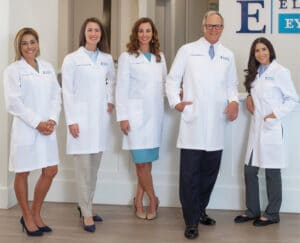Elmquist Eye Group highlights importance of early detection


In fact, subtle changes in vision can easily be written off or missed entirely. While these changes are a common occurrence as we age, they may also indicate a more serious condition.
January is National Glaucoma Awareness Month, bringing awareness to a subtle, yet sight-threatening condition that affects three million people in the United States.
A disease of the optic nerve, glaucoma can progress without any warning signs. In fact, it is estimated that only half of people with glaucoma are even aware they have it. However, if left untreated, this condition can lead to vision loss and even blindness.
“Glaucoma is the second leading cause of blindness worldwide,” said Dr. Yasaira Rodriguez, comprehensive ophthalmologist for Elmquist Eye Group. “However, without regular eye exams to monitor slight changes in vision, this condition is often left undetected until more noticeable signs of vision loss occur, such as diminished peripheral vision.”
Glaucoma is commonly associated with high eye pressures, either as a result of fluid overproduction or a blockage inside the eye’s natural drainage system. Too much pressure within the eye puts strain on the optic nerve, which has potentially vision-threatening consequences.
While glaucoma can affect any person at any age, people over 60 years old as well as those with high blood pressure, diabetes or a family history of glaucoma are at a higher risk of developing the eye disease.
“Comprehensive eye exams are necessary to detect this condition before permanent vision damage occurs, especially for those with higher risk factors,” Rodriguez said. “We have advanced technology such as optic nerve analysis and visual field testing that helps us monitor and detect changes in vision that may be an early indication of glaucoma.”
Your eye doctor may conduct a range of tests to evaluate for glaucoma. Common assessments include measurement of inner eye pressure, visual field testing, optic nerve analysis and imaging, gonioscopy, and measurement of corneal thickness.
While there is no cure for this condition, there are multiple treatment methods that can prevent further damage and protect your vision. Treatment options often include prescription eye drops to help lower the pressure within the eye. Oral medications may also be prescribed. In more advanced cases of glaucoma, lasers and surgery may be needed to control disease progression.
“Many patients experience challenges with administering topical drops, having difficulty remembering doses or skipping them altogether. This greatly reduces the effectiveness of the treatment,” said Dr. Sarah Eccles-Brown, board-certified ophthalmologist and partner at Elmquist Eye Group. “When other treatment options are required, an ophthalmologist can help you make a well-informed decision about your eye care and when surgery may be the next step.”
Minimally invasive procedures including the iStent inject® and Kahook Dual Blade® procedures can help enhance fluid outflow in order to relieve interocular pressure and prevent further damage. Additionally, sustained-release implants such as the DURYSTA™ implant can be injected into the anterior chamber of the eye to help administer drug treatment in place of topical eye drops.
“Depending on a patient’s needs, these minimally invasive options can bring relief by helping ensure that they are receiving the consistent drug delivery they need or even decrease their reliance on glaucoma medications and their associated costs and side effects,” Eccles-Brown added.
A proactive approach to eye care plays an essential role in evaluating, detecting and treating diseases that you may not realize are affecting your vision. Protect your eyes and overall health by scheduling a dilated eye exam with Elmquist Eye Group’s team of highly skilled associates.
With more than 25 years of service to the Southwest Florida community, Elmquist Eye Group offers experienced doctors who are dedicated to patient care. Dr. E. Trevor Elmquist, Dr. Kate Wagner, Dr. Sarah Eccles-Brown, Dr. Nina Burt and Dr. Yasaira Rodriguez of Elmquist Eye Group are available to answer your questions. With three U.S. military veterans leading the practice, Elmquist Eye Group’s team stands ready to serve you right here in Southwest Florida. For more information, visit www.Elmquist.com, call 239-936-2020 or stop by an Optical Boutique location in Fort Myers or Cape Coral.
Elmquist Eye Group
239-936-2020 | www.elmquist.com
FORT MYERS
7970 Summerlin Lakes Dr.
CAPE CORAL
2336 Surfside Blvd., Suite 121
 Southwest Florida's Health and Wellness Magazine Health and Wellness Articles
Southwest Florida's Health and Wellness Magazine Health and Wellness Articles

